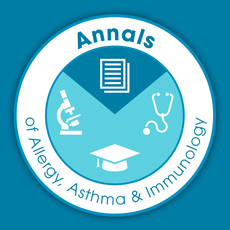 Groundhog Day came and went, and the little guy did not see his shadow, which means an early spring. Many of us are gearing up for the seasonal rush that we all look forward to every spring. However, as you have a little down time between clinics, I want to be sure you take time to examine the February issue of the Annals of Allergy, Asthma & Immunology. The emphasis this month is anaphylaxis and there are multiple offerings that should be interesting to you. I suggest you begin by reading the outstanding editorial by Associate Editor Mariana Castells, MD, FACAAI. She provides an excellent overview of the multiple issues associated with anaphylaxis – from accurate diagnosis to effective therapies to proper use of billing codes – all very practical and important for the practicing clinician who sees these patients.
Groundhog Day came and went, and the little guy did not see his shadow, which means an early spring. Many of us are gearing up for the seasonal rush that we all look forward to every spring. However, as you have a little down time between clinics, I want to be sure you take time to examine the February issue of the Annals of Allergy, Asthma & Immunology. The emphasis this month is anaphylaxis and there are multiple offerings that should be interesting to you. I suggest you begin by reading the outstanding editorial by Associate Editor Mariana Castells, MD, FACAAI. She provides an excellent overview of the multiple issues associated with anaphylaxis – from accurate diagnosis to effective therapies to proper use of billing codes – all very practical and important for the practicing clinician who sees these patients.
Our CME review is by Thomas Platts-Mills, MD, PhD, FACAAI, from the University of Virginia. He discusses alpha-gal-induced anaphylaxis and how this condition has expanded our understanding of the heterogeneity of anaphylaxis as a clinical syndrome. Anaphylaxis represents an extreme manifestation of a form of allergic immunity that appears to have evolved to protect against ‘toxic’ threats that present at skin and mucosal barriers. The factors contributing to a rise in anaphylaxis are increasingly appreciated to relate to changes in hygiene and microbial ecology. Induction of allergen-specific IgG4 is often part of the allergic response and is associated with protection against anaphylaxis. The recognition of the α-Gal syndrome suggests that carbohydrates can be epitopes which are relevant to anaphylaxis and that IgE-mediated reactions do not always occur immediately.
Another interesting article is by Katherine L. Tuttle, MD, and Paige Wickner, MD, from Boston, who report on the importance of accurately capturing anaphylaxis diagnoses through the electronic medical record and the challenges faced by both researchers and claims managers that can affect reimbursement. Inaccurate recognition of the diagnosis by providers, underreporting and cause identification are challenges faced by health researchers using reimbursement codes for anaphylaxis case identification. Education of providers to properly diagnose and treat anaphylaxis requires systematic and educational investments. ICD codes specific to anaphylactic shock have suboptimal positive predictive value (PPV) to identify anaphylaxis in administrative claims databases. A greater understanding of these challenges can help us better present our claims data in an accurate and optimally reimbursable fashion.
There are many other features for your information, education and reading pleasure. As always, feedback is welcome as to how we can make our journal increasing relevant to you our readers.
Gailen D. Marshall, Jr., MD, PhD, FACAAI
Editor-in-chief

